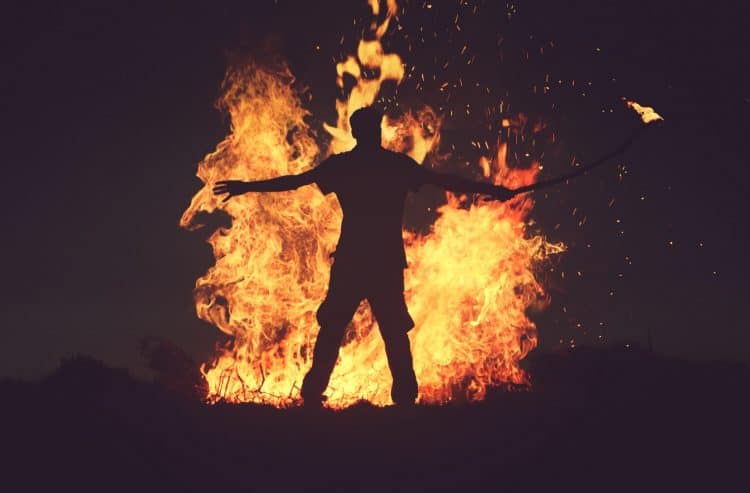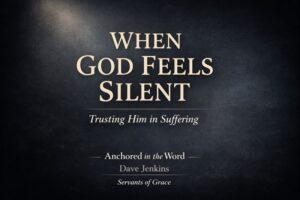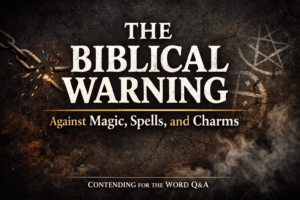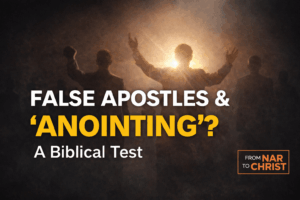⏱️ Estimated Reading Time: 10 min read
The book of James gives remarkable insight into the prayer life of the great prophet Elijah. James 5:17-18 says Elijah controlled the weather with his prayers. He prayed, and it did not rain. For three and half years not a drop fell from the sky. Elijah prayed again, and it rained. This New Testament insight about the power of Elijah’s prayer life makes 1st Kings 19:4 all the more shocking. In 1st Kings 19:4 Elijah prayed to God and asked him to take his life. It’s a suicide prayer. The previous three verses indicate that Elijah prayed this prayer because Jezebel, the wife of King Ahab, had taken out a contract on Elijah’s head. The Bible says Elijah was afraid and asked God to kill him (1st Kings 19:3).
How does this happen? How does a prayer-warrior like Elijah find himself running from the queen, hiding in the wilderness, praying for death? The back story found in 1st Kings 17-19 is both illuminating and perplexing. Illuminating because it explains the events that led up to Elijah’s spiritual collapse. Perplexing because it describes events that should have bolstered Elijah’s faith. The back story begins with Ahab.
We meet Ahab in 1st Kings 16:29-33. Twice we are told that Ahab was more wicked and rebellious than any king who came before him (1st Kings 16:30, 33). He married a Sidonian princess named Jezebel who worshipped pagan gods (1st Kings 16:31). This resulted in Ahab bringing Baal worship and Asherah worship into the capital city of Samaria (1st Kings 16:31). To summarize, “Ahab did more to provoke the LORD, the God of Israel, to anger than all the kings of Israel who were before him” (1st Kings 16:33).
Enter Elijah. His name appears for the first time in 1st Kings 17:1 in contrast to Ahab. The rivalry between these men kicked off with Elijah telling Ahab that the LORD would not send rain on Israel until Elijah prayed for rain (1st Kings 17:1). You can imagine this did not sit well with wicked Ahab, so the LORD told Elijah to hit the road. Elijah camped out east of the Jordan River, and the LORD commanded a flock of ravens to provide his fugitive prophet with food (1st Kings 17:3-7). Note these two miracles. First, Elijah prayed and the rain stopped. Second, God provided safety and food for Elijah. Elijah was beginning to learn about the power of prayer and the provision of God.
The two stories that follow confirm the lessons God was teaching Elijah. First is the story about oil and flour. God sent Elijah to a foreign country where he met a destitute widow (1st Kings 17:8-10). This widow had reached a dead end in life, and she was literally preparing to die (1st Kings 17:12). Elijah told her that if she fed him first, she would not run out of oil or flour until the day God sent rain on the earth (1st Kings 17:14). The widow did what Elijah told her to do, and the newly formed trio of Elijah, the widow, and her son had oil and flour for three and a half years. Again, Elijah was learning about the power of prayer and the provision of God.
The second story in 1st Kings 17 is related to the first. It is a story about death. At some point in time the widow’s son died (1st Kings 17:17). The Bible says Elijah cried out to the LORD about the widow’s son (1st Kings 17:20). Three times he stretched himself out on top of the dead child, crying out to the LORD to bring the child back to life (1st Kings 17:21). The Bible says, “And the LORD listened to the voice of Elijah. And the life of the child came into him again and he revived.” (1st Kings 17:22)
First Elijah controlled the weather. Then he was fed by a flock of ravens. Then he saw the miracle of oil and flour. Then he saw the dead raised. Elijah was continuing to learn about the power of prayer and the provision of God. As great as these miracles were, they were nothing compared to the miracle of 1st Kings 18. After three and a half years with no rain the famine in Samaria was severe, and Ahab decided it was time to talk to Elijah (1st Kings 18:3-6). The LORD agreed, and he sent Elijah to visit with Ahab (1st Kings 18:1-2). Elijah challenged Ahab to a showdown, telling his nemesis to bring the 450 prophets of Baal along with the 400 prophets of Asherah to Mount Carmel (1st Kings 18:19-20).
The story that follows is nothing short of spectacular. Elijah challenged the 850 pagan prophets of Jezebel to see if their gods could send fire from heaven (1st Kings 18:21-24). The Bible says these 850 prophets sang and danced from morning to noon, begging their gods to send fire (1st Kings 18:26). Not surprisingly, “There was no voice, and no one answered.” (1st Kings 18:26) About noon, Elijah began mocking his opponents. He told them to yell louder, suggesting that their god was on a journey or taking a nap or possibly even using the restroom (1st Kings 18:27). Don’t miss the humor in Elijah’s sarcasm, and don’t miss the courage with which he spoke. He is standing in front of 850 people who would love to see him dead, and he has the courage to mock them for their foolish idolatry. This is a man who has learned from droughts and ravens and oil and flour and death. This is a man who knows about the power of prayer and the provision of God.
The 850 prophets continued with their pleas, dancing and raving and even cutting themselves with knives. Again, “There was no voice. No one answered; no one paid attention” (1st Kings 18:29). Finally Elijah took the stage. He drenched his offering in water, proving that what was about to happen was no conjuror’s trick (1st Kings 18:33-35). Elijah prayed to the God of Abraham, Isaac, and Jacob, asking him to show the people that he was the one true God (1st Kings 18:36-37). After Elijah prayed, the Bible says, “The fire of the LORD fell and consumed the burnt offering and the wood and the stones and the dust, and licked up the water that was in the trench.” (1st Kings 18:38) Again, Elijah experienced first-hand the power of prayer and the provision of God.
After executing the 850 prophets of Baal and Asherah, it was time for rain. Elijah climbed Mount Carmel, bowed down on the ground and prayed (1st Kings 18:42). In a matter of moments, a downpour came upon the land (1st Kings 18:45-46). Add this to Elijah’s life experience list. First the drought. Then the ravens. Then the oil and flour. Then the dead raised. Then the fire from heaven. Then the rain. In the most spectacular ways, Elijah had learned to trust in the power of prayer and the provision of God.
You would expect that at this point in his life, Elijah would be on the ultimate spiritual high. Then you turn to 1st Kings 19. In 1st Kings 19:3 we read that the bold, fearless, courageous prophet was afraid because Jezebel had promised to kill him (1st Kings 19:1-3). This makes no sense. He just faced down and slaughtered 850 false prophets, and now Elijah is scared of a death threat from Jezebel? I struggle to understand the rationale behind this fear. Maybe Elijah was tired after a marathon run to Jezreel (1st Kings 18:46). Maybe Elijah was frustrated by the fact that even after God sent fire from heaven the people did not repent (1st Kings 19:4). Maybe Elijah was despondent because he felt like he was the last man on earth who trusted the LORD (1st Kings 19:10). Maybe we just need to remember that Elijah was a man with a fickly nature like ours (James 5:17-18). Or maybe there is another explanation for Elijah’s fear.
In 1st Kings 19:4 Elijah prays this prayer, “It is enough; now, O LORD, take away my life, for I am no better than my fathers.” This is a bold thing to pray, especially when you know the power of prayer like Elijah knew the power of prayer. God could control the weather, multiply food, raise the dead, and send fire from heaven. Surely God could take Elijah’s life when he prayed for death. But instead of death, God sent an angel to feed Elijah, strengthening him for a 40 day journey to the mountain of God (1st Kings 19:5-8).
When Elijah arrived at the mountain of God, the LORD asked him a strange question. Having sent Elijah to the mountain, God asked Elijah, “What are you doing here, Elijah?” (1st Kings 19:9). The obvious answer was, “God, I am your servant, you sent me here, so I’m here.” Instead of the obvious answer, Elijah responded out of the frustration of his heart (19:10). He looked around and saw no results from his labor. No one repented. No one turned back to the LORD. And Elijah assumed he was the only follower of Yahweh.
God sent Elijah to stand on the mountain. God sent a powerful wind that broke the rocks apart. God sent a terrifying earthquake that shook the mountain. God sent a fire that that threatened to consume the mountain. Strangely, the Bible says God was not in the wind or the earthquake or the fire (1st Kings 19:11-12). Instead, God was in the sound of a “low whisper” (1st Kings 19:12). For years I have been puzzled by this story. What was God trying to teach his discouraged prophet? And what about the unanswered question of why Elijah would be afraid of Jezebel and pray for death? I think the answer is obvious when you consider Elijah’s experiences with God up to this point. Elijah had the opportunity to experience some of the most amazing miracles recorded in the Bible. Not only that, but he also had the privilege of participating in these miracles through prayer. God used Elijah’s prayers to control the weather, multiply food, raise the dead, and send fire from heaven. Elijah had come to expect the miraculous and the spectacular when he prayed.
I think this explains Elijah’s fear of Jezebel, his prayer for death, and his experience on the mountain of God. We know Elijah was a man of prayer. It’s logical to assume that he prayed when Jezebel threatened to kill him. And I believe Elijah expected another spectacular miracle to come from the LORD. Maybe a lightning bolt would hit Jezebel? Maybe a lion would devour Jezebel? Instead, nothing happened and Elijah was forced to run for his life. Despondent, he begged for death and complained to God that he was alone in his faith (1st Kings 19:4, 10, 14). God responded with a strong wind and a powerful earthquake and a raging fire. All were spectacular and miraculous. None contained the presence of God. Instead, God was in the still small voice.
God was trying to teach Elijah that prayer does not put God at our command. And while God certainly hears our prayers, and while he can respond with the spectacular and miraculous, sometimes God chooses to answer with a low whisper. There would be no spectacular miracle delivering Elijah from the threats of Jezebel. Instead, a low voice called Elijah to continue his prophetic ministry (1st Kings 19:15-18).
May we pray with the boldness of Elijah. May we remember that God can and does respond in spectacular and miraculous ways. But may we never forget that our prayers never put God at our command. And as we wait for God, may we be satisfied with the spectacular, the miraculous, the mundane, the ordinary, and even the low whisper.
Landon Coleman serves as the teaching pastor of Immanuel Baptist Church in Odessa, Texas, where he lives with his wife Brooke. They have four children, Emma, Noelle, Amelia, and Clayton. Landon is a graduate of West Texas A&M University (BBA), and a two-time graduate of The Southern Baptist Theological Seminary (MDiv and PhD). He is the author of Pastor to Pastor: Practical Advice for Regular Pastors and Pray Better: Learning to Pray Biblically, both of which were published by Rainer Publishing. Landon has pastored churches in Kentucky and Oklahoma, and he has taught for Oklahoma Baptist University and BH Carroll Theological Institute.




